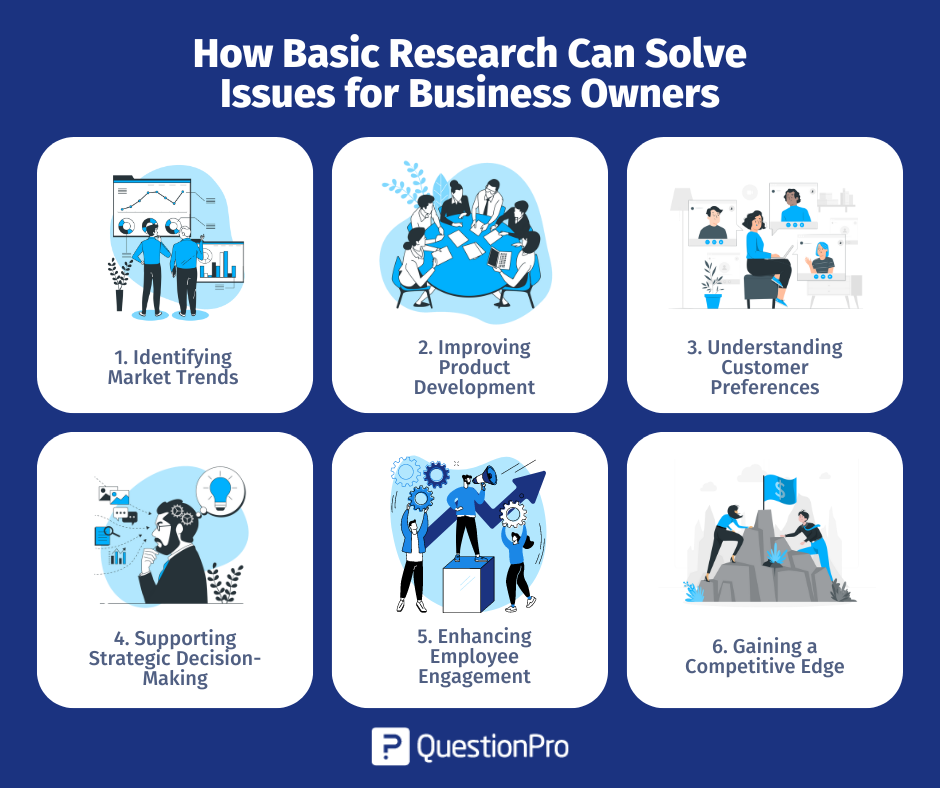
There are many stages and methodologies for building knowledge and generating insights that contribute to its understanding and advancement; basic research and applied research are usually the most effective on this path.
Understanding research allows us to understand all the properties of a specific science or phenomenon at a fundamental level. Some examples are branches such as sociology, humanities, and other scientific fields. Below, we will tell you everything you need to know about this type of research and its possible applications.
What is Basic Research?
Basic Research is a type of scientific research used to understand and extend our knowledge about a specific phenomenon or field. It is also accepted as pure investigation or fundamental research.
It can also be called foundational research; many things get built on this foundation, and more practical applications are made.
This research, often focused on gaining fundamental knowledge without immediate application, can help solve issues for business owners in several ways:
- Informed Decision-Making: Basic research helps business owners understand broader industry trends, customer behavior, and emerging technologies, allowing them to make more informed strategic decisions.
- Innovation and New Opportunities: By investigating foundational concepts, businesses can discover innovative approaches, new product ideas, or untapped markets, enabling them to stay ahead of competitors.
- Problem-Solving: Basic research can uncover the root causes of business problems, such as operational inefficiencies or customer dissatisfaction, leading to more effective solutions.
- Competitive Advantage: Investing in basic research allows companies to access unique insights, giving them a competitive edge by creating more advanced products or services than their competitors.
- Understanding Market Dynamics: Basic research helps in understanding the deeper factors affecting market dynamics, such as economic forces, consumer psychology, or cultural shifts, which can help in adapting strategies accordingly.
- Long-Term Sustainability: Basic research supports the development of long-term strategies by offering a deeper understanding of future challenges and opportunities, helping businesses become more resilient and adaptable.
Basic Research vs Applied Research
Basic Research finds its counterpart and complement in applied research. They are two handy research methods for generating and giving utility to the generated data. There are marked differences; understanding them will allow you to understand the path to new knowledge and improve knowledge management.
The most important difference between basic and applied research lies in their objectives. Basic research seeks to expand the information and understanding of the object of study, while applied research aims to solve the problem studied.
The relationship between these two types of research is usually very close since the methodologies used are often quite similar. A significant change is found in the initial and final points of the investigation.
Basic Research Examples
Let’s explore aspects that can help businesses gain valuable insights that improve processes, strategies, and overall success. Here are some examples of basic research studies that can address common challenges and pave the way for better decision-making within organizations:
- A study of how stress affects labor productivity:
This research could explore how stress levels impact an employee’s focus, efficiency, and output. Measuring productivity before and after high stress to do trend analysis and establish a more explicit link between workplace stress and employee performance. - Studying the best factors of pricing strategies:
This research might analyze various pricing models (e.g., cost-plus, value-based, or competitive pricing) to determine which strategy is most effective in driving sales, maximizing profit, or improving customer satisfaction. It could also explore consumer behavior in response to price changes or psychological pricing techniques. - Understanding the client’s level of satisfaction before specific interactions with the company providing solutions:
This study will evaluate customer expectations, perceptions, and satisfaction levels before major touchpoints, such as purchase decisions or after-sales services. The goal would be to identify customers’ feelings before engaging with the company and how those feelings influence the overall experience. - The understanding of the leadership style of a particular company:
Research in this area would examine the dominant leadership styles (e.g., autocratic, democratic, transformational) within a company and how they influence employee morale, decision-making, and organizational culture. The goal is to understand which leadership styles yield the best results regarding engagement, productivity, and company growth.
Advantages & Disadvantages
Basic research is critical for expanding the pool of knowledge in any discipline. The introductory course usually does not have a strict period, and the researcher’s concern commonly guides them. The conclusion of the fundamental course generally applies in a wide range of cases and plots.
At the same time, basic studies have disadvantages. Its findings have limited or no constructive conclusions. In another sense, fundamental studies do not resolve complex and definite business problems, but they do help you understand them better.
Taking actions and decisions based on the results of this type of research will increase the impact these insights may have on the problem studied if that is the purpose.
How to do Basic Research?
This process follows the same steps as a standard research methodology. The most crucial point is to define a thesis or theory that involves a perfectly defined case study; this can be a phenomenon or a research problem observed in a particular place.
There are many types of research, such as longitudinal studies, observational research, and exploratory studies. So the first thing you should do is determine if you can obtain the desired result with research or if it is better to opt for another type of research.
Once you have determined your research methodology, the data collection process begins, depending on your study type. Sometimes, you can collect the data passively through observation or experimentation. Alternatively, you can intervene directly and collect quantitative information with tools such as surveys.
QuestionPro provides various functions and tools for conducting research. Our survey software has helped students and professionals obtain all the information necessary to generate high-value insights.
In addition, it has a data analysis suite with which you can analyze all this information using various reports for a more straightforward interpretation of the final results.
QuestionPro is much more than survey software; we have a solution for each specific problem and industry. We also offer data management platforms such as our research data repository called Insights Hub.
How Basic Research Can Solve Issues for Business Owners
Basic research, frequently considered academic or theoretical, can be a powerful tool for business owners looking to solve practical challenges and improve operations. Here’s how it addresses critical business issues:

1. Identifying Market Trends
Basic research helps businesses stay ahead by uncovering new trends, behaviors, and emerging market needs. By understanding these shifts early, companies can adjust strategies and capitalize on opportunities before their competitors.
2. Improving Product Development
Innovations come from a deep understanding of evolving technologies and consumer desires. Basic research provides the foundational knowledge necessary to develop products that meet future demands, enhancing the potential for long-term success.
3. Understanding Customer Preferences
The research delves into the ‘why’ behind customer decisions, providing valuable insights into what drives consumer behavior. Businesses can use this information to create more targeted and effective marketing strategies or improve their offerings.
4. Supporting Strategic Decision-Making
Data-driven decision-making is crucial in business. Basic research helps owners make informed choices about new ventures, product launches, or market expansion, reducing risks associated with uncertainty.
5. Enhancing Employee Engagement
Research into organizational behavior can reveal insights about employee satisfaction and motivation, leading to a more engaged workforce and improved retention rates.
6. Gaining a Competitive Edge
Understanding industry standards and competitors through research allows businesses to differentiate themselves, offering unique value propositions and staying ahead in a crowded marketplace.
Conclusion
This type of research contributes to the intellectual body of knowledge. Basic research is concerned with generalizing a theory in a branch of knowledge. Its purpose is usually to generate data that confirm or refute the study’s initial thesis.
With the proper research tools, businesses can turn these insights into actionable strategies. A platform like QuestionPro offers advanced survey and analytics features that make conducting and leveraging basic research easier and more effective, providing business owners with the tools they need to thrive. Start today!







